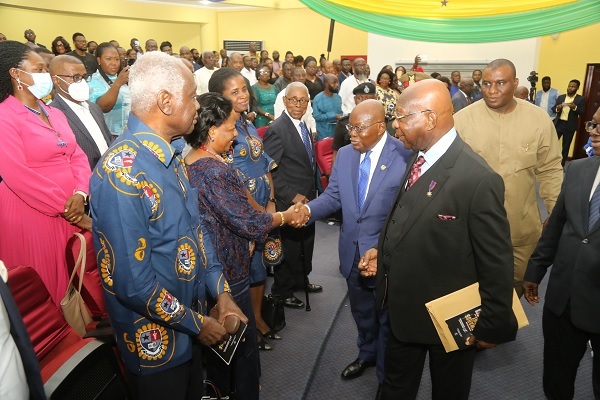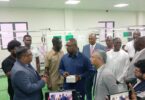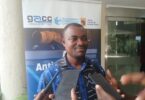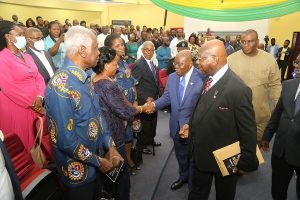
Source: www.graphic.com.gh
Treatment for mental health will now be added to the benefits of the National Health Insurance Scheme (NHIS) from next year, President Nana Addo Dankwa Akufo-Addo has stated.
The move, in addition to the construction of Agenda 111 health facilities and other measures, are part of the government’s commitment to improving access to professional, accessible and affordable quality health services for the Ghanaian.
President Akufo-Addo disclosed this last Tuesday in a keynote address at the maiden awards night and commemoration of the 20th anniversary of the annual general and scientific meeting of the Ghana College of Physicians and Surgeons in Accra.
The college is a public institution established in 2003 to provide postgraduate medical training in medicine, surgery and related disciplines.
The National Health Insurance Authority (NHIA) in June last year added treatment for the four common childhood cancers to the NHIS Benefit Package.
These are Acute Lymphoblastic Leukemia, Burkitt Lymphoma, Retinoblastoma and Wilms Tumor.
Addressing members of the college and stakeholders in the health sector, President Akufo-Addo said as part of measures to improve access, the government recently introduced technology to enhance the NHIS. As a result of that, renewal has been simplified by dialing *929# on any mobile phone network.
Payment
The President added that active membership of the scheme had increased to 17.3 million subscribers at the end of last year from the 4.3 million at the end of 2016, while the chronic complaints of non-payment of claims had given way to a new improved regular payment regime to health facilities which now stood at just two months in arrears.
Agenda 111
Touching on the Agenda 111, the President said the projects would cost a total of $1.65 million. The Agenda 111 project includes the provision of standard 100-bed district hospitals with accommodation for doctors and nurses in districts without district hospitals, four regional hospitals and two psychiatric hospitals.
President Akufo-Addo said currently, works on 86 of the district hospitals, two regional psychiatric hospitals and the Western Regional Hospital were ongoing and were at various levels of completion, ranging between 52 per cent and 80 per cent complete.
Specialist
The President said the government recognised that key to achieving universal health coverage was the availability of specialists in all hospitals in the country, adding that “It is about time we began to set our targets higher and ensure that every single doctor who graduates from medical school proceeds right after their house officer training into specialisation”.
He charged the college, the Ghana Medical and Dental Council, the Ghana Health Service and the Ministry of Health to work together to ensure that the country also achieved the target.
President Akufo-Addo indicated that the training of postgraduate doctors was an expensive venture and that the cost must be borne by the government.
Although the decision by the government to reimburse the college for the cost some three years ago had not materialised, the President gave an assurance that the Ministry of Health would work to ensure that it was done.
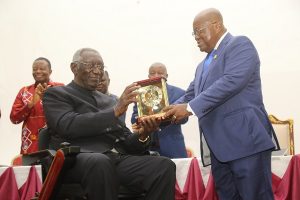
President Akufo-Addo presenting a shield to former President John Agyekum Kufuor for his dedicated service to the vision of postgraduate training in Ghana. Pictures: SAMUEL TEI ADANO
Contracts
Regarding the request by the college to ensure that fellows who attained the mandatory retiring age be given automatic post-retirement contracts for them to continue to train specialists,
President Akufo-Addo gave his word that the government was willing to undertake that to facilitate postgraduate medical training.
He urged the leadership of the college and the relevant state agencies to come up with a policy document that spelt out the details of the post-retirement contract for the consideration and decision of cabinet.
President Akufo-Addo cautioned that while drawing the policy document, they should ensure that they put in all measures that would prevent the good initiative from being abused.
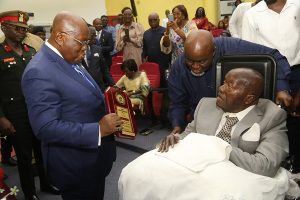
President Akufo-Addo presenting a shield to Prof. Christian Charles Adomakoh (right), Founding College Treasurer, for his outstanding contribution
Decentralised training
The Rector of the college, Professor Richard Adanu, said some hospitals in the country had been accredited to be training centres for specialist training, noting that as we expand the decentralised training, “we are making use of technology to ensure that trainees in any part of the country can have access to lectures, electronic journals and databases”.
That, Prof. Adanu explained, had been possible through partnership with the World Health Organisation, the Tropical Health Educational Trust of the United Kingdom, the Foreign and Commonwealth Office of the British High Commission in Accra and others.
Source: www.graphic.com.gh


